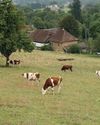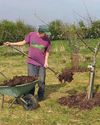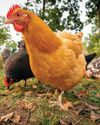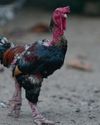
Alpacas can suffer from all sorts of health problems, just like humans or any other animals. Just as you wouldn't jump into deep water if you couldn't swim, many problems with alpacas can be avoided. So it's important to understand how to care for them in regard to diet, grazing, fencing, shelter and transport. On the other hand a local farmer, when he heard I was starting out with alpacas, said 'when you have livestock you will have dead stock', which is a truism we just have to deal with when it happens, but meanwhile taking the best care we possibly can of these wonderful creatures.
To get the worst over with first: if one of your alpacas dies, and the cause it not obvious, it may be necessary to have a post mortem examination done by a vet. This is the best way to protect the rest of your herd, as preventative treatment can be started right away, e.g. in the case of an undiagnosed parasite problem, or animals can be separated in the case of contagious disease.
We have had just a couple of cancer cases over our 33 years of breeding alpacas but, considering we are a large farm, that doesn't seem too bad! Birth defects have also been few and far between. If an alpaca needs to be euthanised for any reason your vet can do this by introducing a drug into the bloodstream and the animal just goes quietly to sleep. Then, as with all animal deaths, both pets and farm animals, it is illegal to bury a carcass. Your vet would normally dispose of smaller animals. However, larger animals need to be collected by a knacker man - your vet would know one. In either case the animals would be cremated.
AN UNEXPECTED PROBLEM
This story is from the {{IssueName}} edition of {{MagazineName}}.
Start your 7-day Magzter GOLD free trial to access thousands of curated premium stories, and 9,000+ magazines and newspapers.
Already a subscriber ? Sign In
This story is from the {{IssueName}} edition of {{MagazineName}}.
Start your 7-day Magzter GOLD free trial to access thousands of curated premium stories, and 9,000+ magazines and newspapers.
Already a subscriber? Sign In

How to Buy a Smallholding in France- Long-time smallholder Lorraine Turnbull looks at the practicalities of moving to rural France
Aspiring smallholders are continually thwarted by the prices of smallholdings and property with land located within the UK. Even the humblest croft in Scotland comes with a substantial price tag and conditions which would make even an adventurous wannabee consider carefully. But all is not lost. For those willing to take the adventure of a lifetime, there is always Europe, and one of the most popular places is France.

Meet the Bournemouth goats and their supporters
These capricious animals are hard workers preserving the natural habitat

Still warm enough to sit outside with a Pizza
Henrietta Balcon uses fresh figs to create an unusual dish at Harvest time

Goodbye to the birds of spring and summer
If you look and listen you might be able to see them preparing to leave says The RSPB

Get ready for the colder weather in the warmth of late summer
Claire Waring advises on doing the best to make sure your colonies survive until next spring

Preparing the Veg Patch for Winter
Lee Senior says, a well-run plot can excitingly continue to produce good quality, tasty, fresh food for much of winter

Time to prepare to plant your orchard
Wade Muggleton, smallholder and author of The Orchard Book, shares his practical experience so you can create your own fruit collection

Choosing feed for the autumn
As autumn approaches, Joanna Palmer, nutritionist at the Smallholder Range, offers advice on choosing the right feed to support your adult birds through their annual moult and ensure your young birds grow and finish well at this time of the year.

Vet advice from an experienced poultry vet
Reflecting on how much the humble hen has helped people world wide plus advice on stopping the scourge of red mite

Give your hens some support
Paul Donovan looks at the right and wrong ways of handling birds